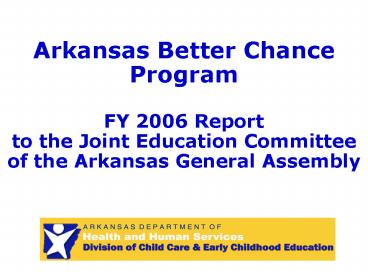Arkansas Better Chance Program - PowerPoint PPT Presentation
1 / 25
Title:
Arkansas Better Chance Program
Description:
Since 2003, Arkansas has increased its financial commitment to ... Woodcock-Johnson Tests of Achievement. Social Skills Rating System (Gresham & Elliot, 1990) ... – PowerPoint PPT presentation
Number of Views:51
Avg rating:3.0/5.0
Title: Arkansas Better Chance Program
1
- Arkansas Better Chance Program
- FY 2006 Report
- to the Joint Education Committee
- of the Arkansas General Assembly
2
ABC Enrollment by Program Type
3
Since 2003, Arkansas has increased its financial
commitment to public pre-K education by over 500.
4
(No Transcript)
5
ABC PARTICIPATING AGENCIES BY TYPE
6
(No Transcript)
7
(for multi-classroom sites only)
8
CENTER AND CHILD CARE FAMILY HOME FUNDING
4,400 PER CHILD
2,933 PER CHILD
Reimbursed by State
Provided by program (cash or in-kind)
9
HOME-VISITING (HIPPY PAT) FUNDING
1,557 PER CHILD
1,038 PER CHILD
Reimbursed by State
Provided by program (cash or in-kind)
10
Programs who have families where the household
income is 200 250 of Federal Poverty Level
have the option of allowing parents to pay a fee
to participate in ABC. The State will reimburse
the remaining portion.
11
Monitoring Program Quality
- Contract Consultants
- Provide technical assistance to help programs
achieve quality status for ABC classroom space - Monitor program activity for compliance with
Early Childhood Environmental Rating Scale
(ECERS-R). - Monitor for compliance with classroom guidelines
(ratios, children).
12
Monitoring Program Quality
- Each area is rated on a scale from 1 to 7.
- Space and Furnishings
- Personal Care
- Language Task and Reasoning
- Activities
- Interaction
- Program Structure
- Parent/Staff
13
Monitoring Program Quality
- ABC programs must achieve ? 5.5 overall.
- All subscores ? 4.5.
- Programs scoring below acceptable will be
reviewed again in the Spring. - Programs not passing ECERS after two visits must
accept a corrective action plan with mandated
technical assistance. - Programs not passing ECERS after three
evaluations will lose ABC funding.
14
Measuring Short-Term Outcomes
- ABCSS children are to be assessed annually using
an instrument which correlates to the Arkansas
Early Childhood Frameworks - Assessment facilitates two important goals
- Classroom planning
- Program Accountability
15
- Work Sampling System by Pearson Early Learning
was chosen. - Curriculum-neutral, observation-based
- Effectiveness proven through valid research
- Correlates to Frameworks
- On-line version allows for greater management of
assessment reporting, and data storage for
teachers and administrators.
16
- ABC children are
- assessed 3 times
- annually over 7
- developmental domains
- Personal and Social Development
- Language and Literacy
- Mathematical Thinking
- Scientific Thinking
- Social Studies
- The Arts
- Physical Development and Health
17
2004-05 Final Assessment Data Personal Social
Development
18
2004-05 Final Assessment Data Language and
Literacy
19
2004-05 Final Assessment Data Mathematical
Thinking
20
2004-05 Final Assessment Data Physical
Development and Health
21
Measuring Long-Term Outcomes
- Legislation calls for longitudinal study to
measure effect of ABCSS program on kindergarten
readiness. - Rutgers University/NIEER, in association with
University of Arkansas at Little Rock, was chosen
to conduct study beginning this fall.
22
Measuring Long-Term Outcomes
- Random sample of 500 each
- Pre-K now attending ABC program
- Kindergartners attending ABC
- Kindergartners not attending ABC
- Children assessed and compared using instruments
which measure - Vocabulary
- Phonics
- Math skill development
- Social development
23
Measuring Long-Term Outcomes
- Child Assessment Tools
- Peabody Picture Vocabulary Test - 3
- Preschool Comprehensive Test of Phonological and
Print Processing (Pre-CTOPP) - Woodcock-Johnson Tests of Achievement
- Social Skills Rating System (Gresham Elliot,
1990) - Work Sampling
24
Measuring Long-Term Outcomes
- Current Status of Longitudinal Study
- First data collection period has been completed
and data is being analyzed. - Second data collection period will begin in
February 2006. - Preliminary data available in May 2006.
25
ARKANSAS Only state to receive 10 out of 10 on
quality pre-K benchmarks in 2004 State of
Preschool Report by NIEER































